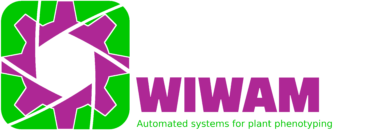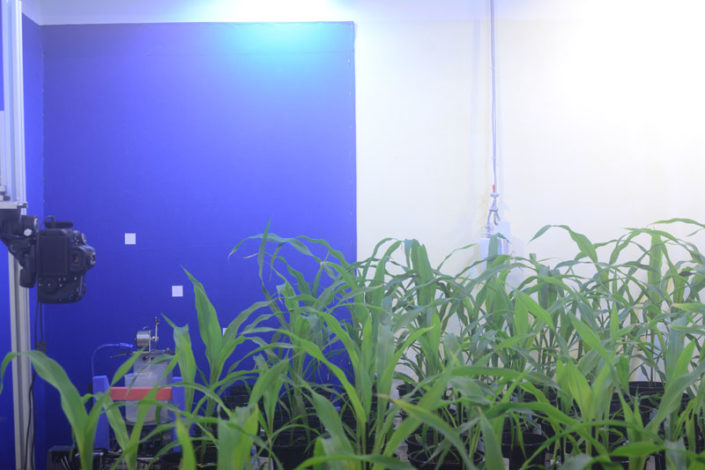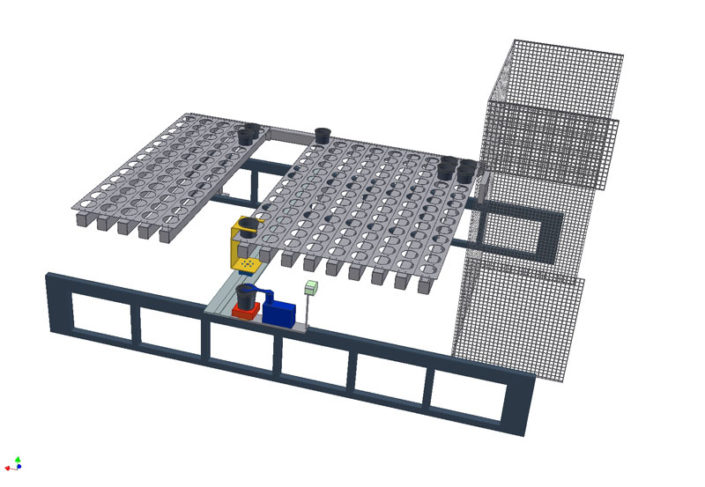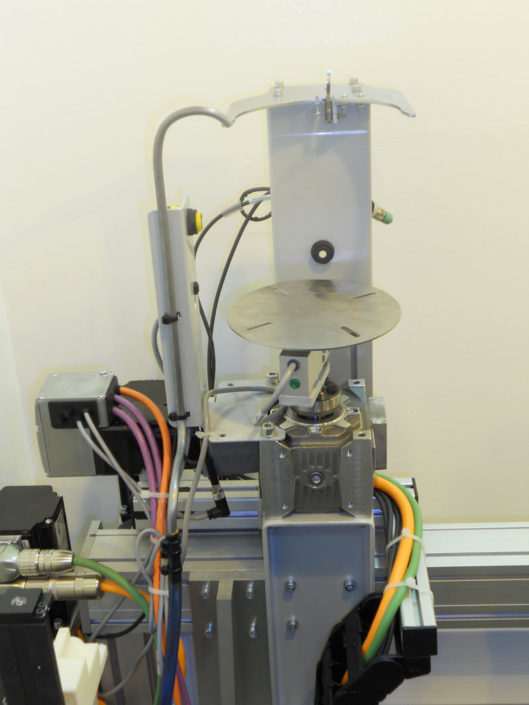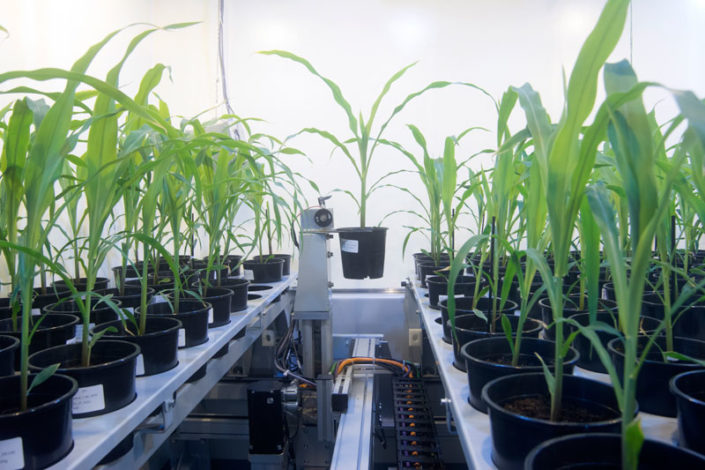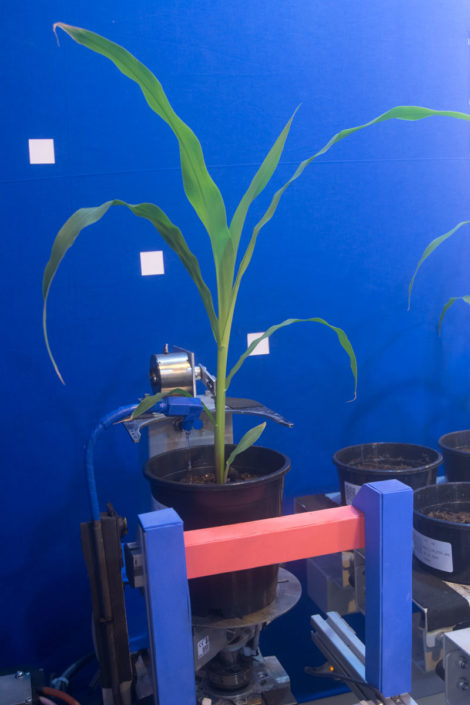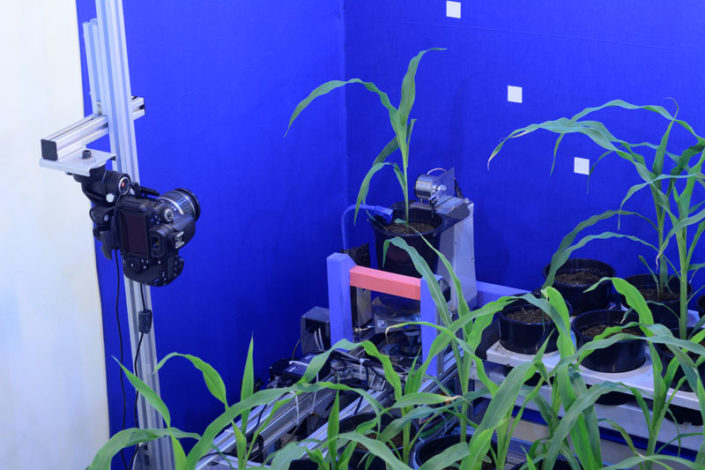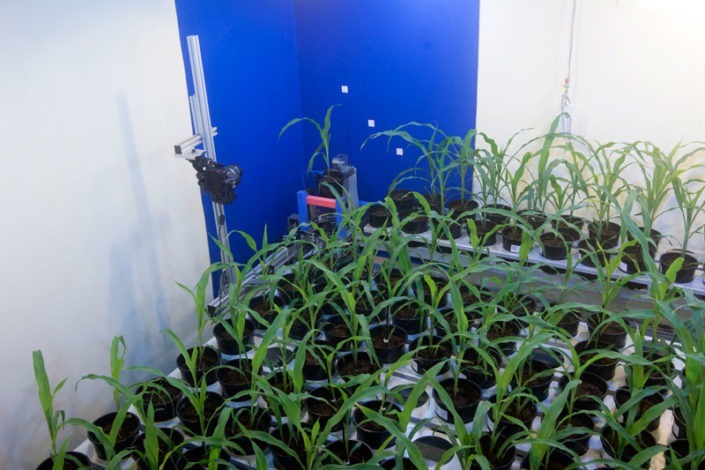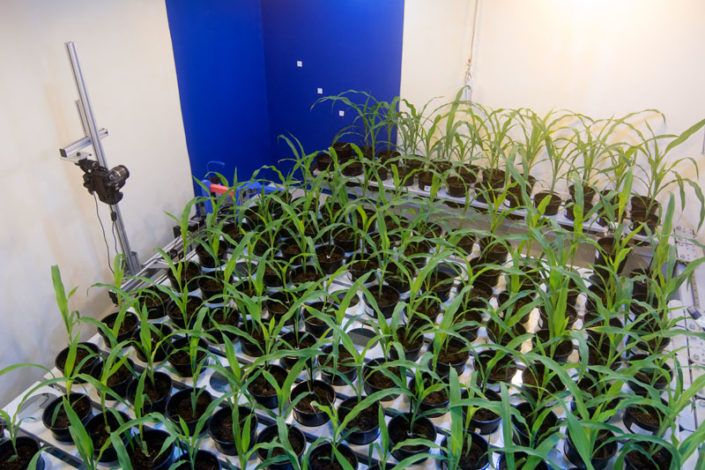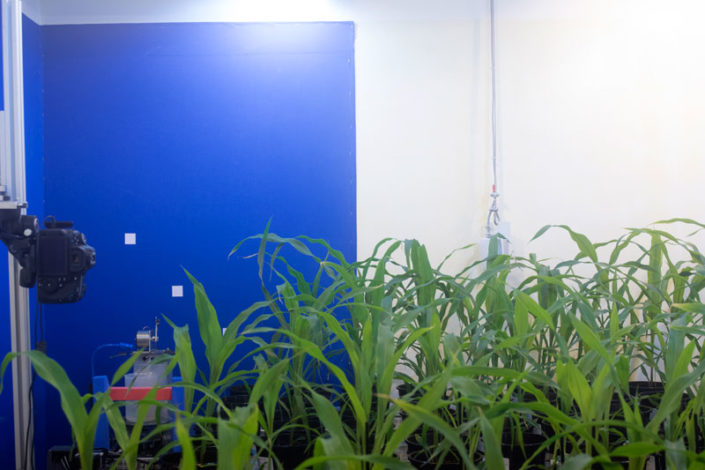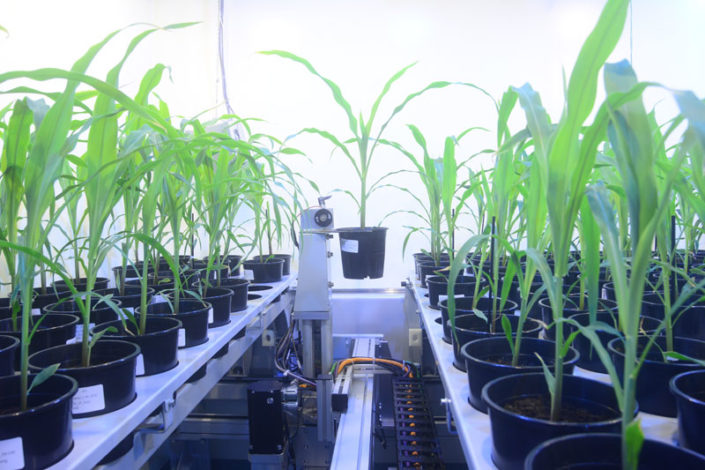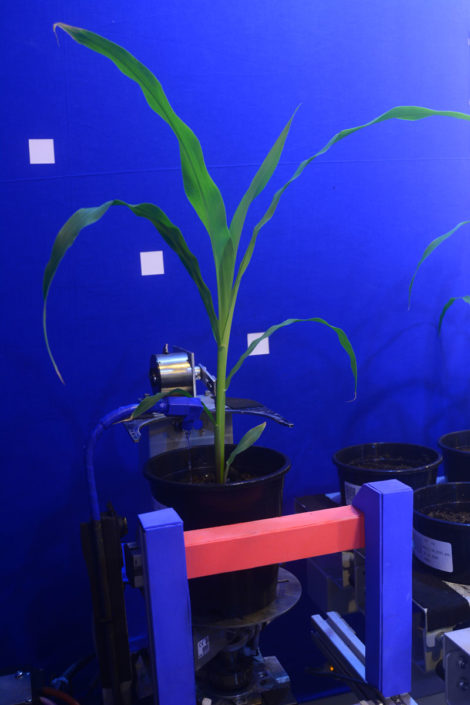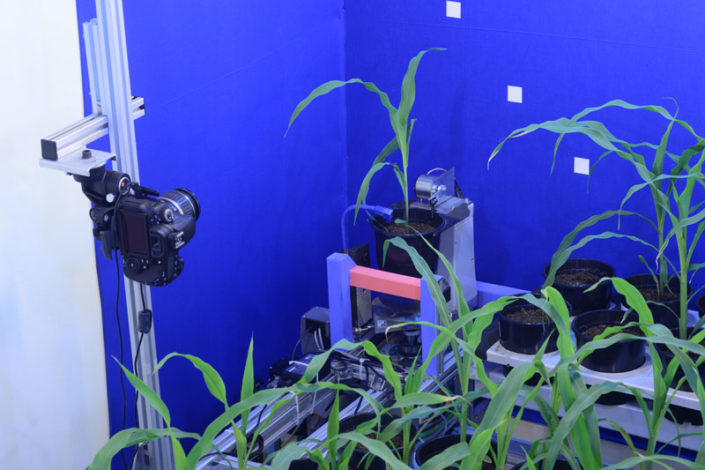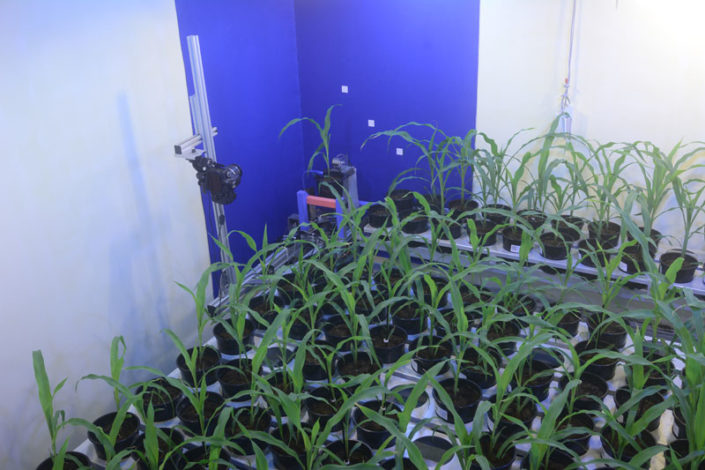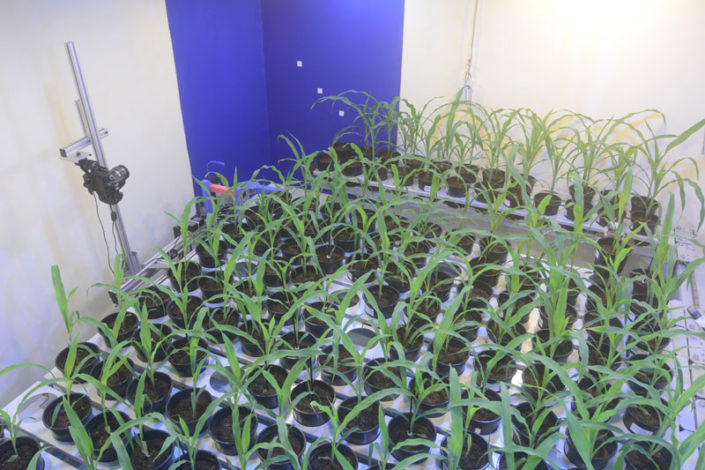
WIWAM Line is a robot for the high-throughput and reproducible phenotyping of small caulescent plants, such as small maize plants. The robot allows for the automated irrigation and the measurement of a variety of plant growth parameters at regular time intervals. WIWAM line replaces a lot of manual handling, saving time and costs, and does this with high precision.
WIWAM Line comprises a pot positioning table, consisting of several individual lines, an underlying portal robot, and one or more stations for imaging or weighing/watering activities. The complete system can be implemented in an existing growth room and is build with high-quality industrial parts.
Plants are grown in individual pots, which are picked up by the robotic arm at preset time intervals, bringing them to the imaging and weighing-watering stations. The robot pushes the lines of the table aside to create the required space in between for the robotic arm to locate a pot and lift it out of the table. An RFID reader, combined with RFID tags at the bottom of the pots, can be implemented as an additional pot identification method, recognizing and correcting for manual pot positioning mistakes on the table.
Images are typically acquired from different angles by a side view camera. An imaging station can accommodate a range of camera systems for non-invasive image acquisition. A combined weighing/watering station has been integrated on the robotic arm. Here, plants rotate while watering for an optimal water distribution in the pot. Irrigation precision is very high and goes up to +/- 1 mL. Moreover, irrigation can be based on automatically calculated target weights or on fixed volumes. This allows for accurate soil humidity levels throughout the whole experiment. Furthermore, the environment can be monitored by the integration of light, temperature and humidity sensors, for a detailed recording of the experimental growth conditions.
Highlights
- Pots rotate while watering for an optimal water distribution.
- High-precision irrigation (up to 1 mL !).
- WIWAM Line can be equipped with environmental sensors.
- WIWAM Line comes with an intuitive user interface.
- Open database structure.
- Fully customized and tailor-made systems are possible.
IT solutions and storage
The WIWAM software runs on a high-end industrial PC with touch screen. This software comes with a user friendly graphical user interface and serves to control the robot actions and to design experiments with an extremely high level of flexibility. Multiple experiments can run simultaneously, different randomization modes are possible and treatments per plant or group of plants can be freely scheduled in time. At the preset start time, the PC will transfer commands to an industrial PLC that will take care of the robot movements.
All imaging, weighing/watering, and environmental data is stored in an SQL database, and is available for analysis minutes after recording. An open database structure has been implemented and images are directly accessible. The platform can be linked with a high-performance computer for analysis and storage of image data or can be integrated with your local server infrastructure.
An SMS and mail service can notify users upon machine warnings and errors, making a fast user intervention possible. The system can be paused and stopped at any point and a UPS (uninterruptable power supply) prevents data loss and ensures full system recovery after a power failure. The software also provides access to system settings and maintenance actions to platform administrators.
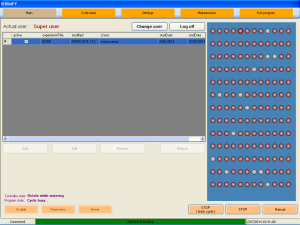
Image analysis and data visualization
WIWAM Line is backed up by Image analysis and data visualization software developed by VIB. The software package, called PIPPA, is the central web interface and database that provides the tools for the management of the different types of WIWAM plant phenotyping platforms on the one hand, and the analysis of images and data on the other hand.
PIPPA communicates with the platforms by transferring experiments created in the PIPPA web interface to the platform. Treatment and genotype information for each pot is defined in the database in order to ensure data integrity across experiments. During the run time of the experiment, PIPPA retrieves weighing and irrigation measurements, environment data, error logs as well as images from the platform. Post-processing (rotation/cropping/etc.) of these images is supported in PIPPA. Image analysis scripts can be initiated in the PIPPA interface, and are set to run either on the web server (stand-alone version) or on a computing cluster for rapid result generation. Afterwards, the output of these scripts can be validated in the web interface by checking whether data fall within certain bounds or, for example, whether growth-related traits such as plant shoot area show an increase over time.
Environmental and weighing/watering data collected from the platform and image processing data are displayed in PIPPA by means of a chart-generating component which supports several chart types, as well as a zoom and an export-to-file feature. Data can also be imported from files into PIPPA or exported from the PIPPA database to a file to maximize its range of utilities. Furthermore, as all image data is directly accessible, images can easily be processed by your favorite analysis script.
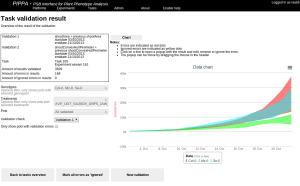
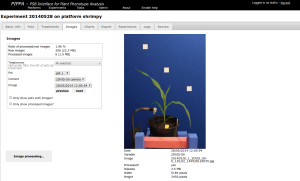
Use WIWAM Line !!!
Genetic resources and sequence data are accumulating quickly, while linking this information to gene function is progressing at a much slower pace, indicating that plant phenotyping is a major bottleneck in the process of understanding the genomic code and implementing this knowledge to improve crop productivity. Phenotyping is widely recognized as the most laborious and technically challenging part of the process, making it costly and time consuming. However, this ‘phenotyping bottleneck’ can now be addressed by combining novel image acquisition technologies, robotics, image analysis, and data processing. WIWAM Line integrates these strategies and replaces a lot of manual handling. This plant phenotyping platform can be incorporated in a plethora of research domains, including plant growth regulation, drought tolerance, plant physiology, stress response to salinity or heavy metals. It can also be used to study the effect of chemicals or to analyze plant growth under various light conditions, nutrient levels or soil types.
Shape your WIWAM Line !!!
The standard WIWAM Line setup can be extended and adapted in order to be able to answer your specific research question or to optimally fit your available space. Several image acquisition systems can be implemented and specific pot sizes can be accommodated. Contact us for more information.
